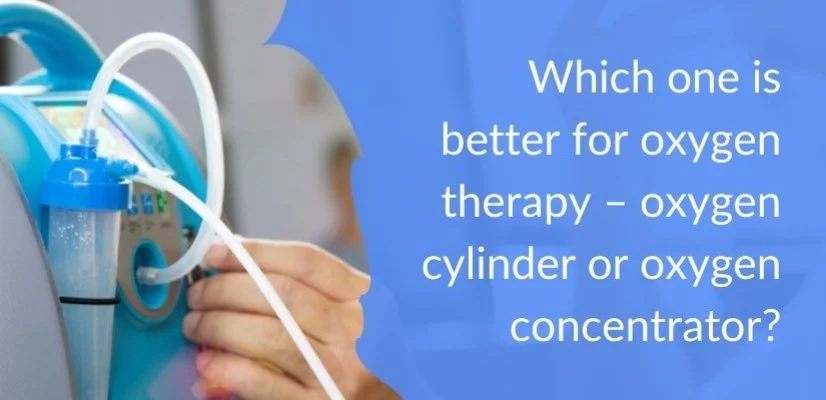Difference between an oxygen concentrator and an oxygen cylinder
Both oxygen cylinders and oxygen concentrators are used to provide oxygen to patients who require it. However, the delivery mechanisms are vastly different. Oxygen Cylinders are more common in India, although Oxygen Concentrators are becoming increasingly popular among doctors and patients. The key distinction is in how oxygen is delivered. Oxygen Cylinders contain a finite amount of compressed oxygen that the user inhales until it runs out. Oxygen concentrators continuously filter and produce medical-grade oxygen as long as the battery is operational. They function like air conditioners, taking in air, altering it, and returning it in a purified form to patients with low blood oxygen levels. Both cylinders and tanks serve the same purpose, but the latter already contains compressed oxygen. The supply in the tank reduces gradually until it is exhausted, requiring a refill or replacement. Oxygen Cylinder vs. Concentrator
This distinction also shows the dosing strategies employed by each device.
- All oxygen cylinders deliver oxygen on a continuous flow
- It varies by device with oxygen concentrators, as some of the more portable options use pulse-dose delivery.
Benefits of an oxygen concentrator
- Consistency — Unlike oxygen cylinders, which can run out of oxygen, oxygen machines will never run out of oxygen as long as there is air and power available. An oxygen machine absorbs oxygen from the air itself, allowing for a limitless and convenient supply.
- Safety — An oxygen cylinder could start to leak, and oxygen-saturated air can cause a fire. If a fire starts under these conditions, it will be more difficult to put out since oxygen-induced fires burn hotter than many other types of fires. By producing oxygen only when needed, pulse-dose oxygen machines prevent the risk of leaks and, consequently, flammability.
- Size — An oxygen machine is designed for portability and ease, therefore it is significantly lighter. Oxygen cylinders, on the other hand, are large, bulky, and heavy.
- Cost – The cost of Oxygen Concentrators is primarily upfront. Over time, there will be ongoing costs associated with Oxygen Cylinders, such as acquiring new ones as needed. Innovative companies like Medikart in India are making Concentrators cheaper by renting them out for long periods of time.
Drawbacks of an oxygen concentrator
- Batteries required: Because oxygen machines do not use pressurized oxygen in a tank, they must rely on battery or electric power to filter air and deliver oxygen.
- Noisy: Oxygen machines draw oxygen from the air, filtering and compressing it for the user. Because of the different components at work, this process can be quite noisy.
- Expensive: Oxygen machines are sometimes extremely pricey up front due to the complicated mechanics at work.
Benefits of an oxygen cylinder
- No electricity required: One of the most notable advantages of oxygen tanks is that they operate by utilizing the compressed oxygen contained within them.
- Silent: There are no beeps or loud noises associated with using oxygen tanks because they merely deliver their contents at a set rate.
- Initial costs are lower: Oxygen tanks are the most common type of personal oxygen, and they are also the most affordable.
- The cylinder saves time by instantly providing oxygen to the patient without requiring warm-up time, unlike the oxygen machine.
Drawbacks of an oxygen cylinder
- Heavy: People commonly mention the weight and portability of oxygen tanks as two significant downsides. This means that due to the device’s weight, lifting the tank can be difficult
- Oxygen tanks contain a fixed amount of oxygen, and users must refill or replace them with a new tank when they are empty.
- The long-term cost increases due to the regular replenishment or replacement of oxygen tanks, which eventually outweighs their initial low price.
For all of the reasons stated above, an oxygen machine is an excellent choice. During power outages, it is advisable to have a backup Oxygen Cylinder and fully charged batteries for the Oxygen Concentrator. I hope this article was helpful and informative in your oxygen therapy journey!
Oxygen Cylinder vs. Concentrator
Disclaimer
The information provided is for general knowledge only. Consult your doctor for personalized advice and treatment. Medikart HealthCare is not liable for any actions taken based on this info.

